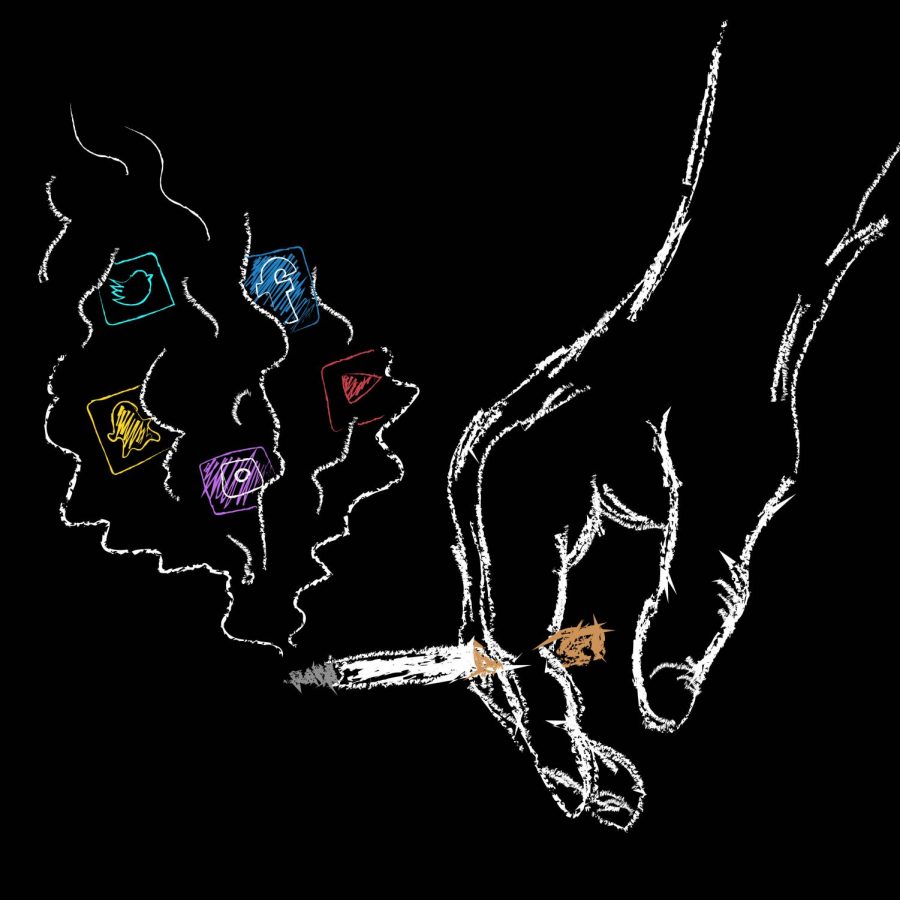Social media needs to stop profiting off of teen insecurity
February 22, 2021
Social media will be our generation’s cigarettes. Come ten or so years from now, we are going to wonder why we let so many children have free range access to such destructive platforms.
I remember in 8th grade I came home with a pretty poor report card and had my phone taken away. For around 4 or 5 months my smartphone consisted of three apps, Messages, Phone, and Safari.
At the time I was incredibly upset. I felt like I was missing out on everything, and because of how prominent social media is amongst kids as young as 11, 12, and 13, I was.
Now I wish everyone’s phones were that way.
Over this past winter break I decided to put away my smartphone for good. After a long conversation with a friend from home, we decided to switch to flip phones.
Within the first week I noticed that I was much more present in the outdoors. There was no reason to go on this thing, it was a rectangular brick, only meant for texting and calls.
Although it did have a dating app called Datinga from the app store that, yes, I did download.
But if I’m being honest I wasn’t online any less with this phone. My use of social media only moved laterally, I switched from scrolling through Instagram on my smartphone to surfing through NBA Twitter on my computer and watching Stephen A. Smith talk basketball nonsense.
I was still addicted. The idea I had that switching phones would rid mefinish the end of my need for constant stimulation was foolish.
I don’t want other kids to be this way and I’m especially worried about young kids on social media today.
Yes, I know I am also still young.
But I’m more focused on the middle schoolers.
A 2020 Netflix documentary titled The Social Dilemma reported that since social media became available on mobile phones, self-harming rates by girls age 10-14 have risen 189%.
Taking away my smartphone in 8th grade was the right thing to do. My parents were just doing it for the wrong reason.
The amount of access iPhone’s provide is a driving force in the rise of anxiety and depression in Gen Z.
We have things like SnapMap that allow us to see our peers’ locations, which becomes toxic when you see it as every party you’re not attending. This system is predatory.
Numerous people from my high school would only make their SnapMap location public at parties for others to see on the map. Social media made the high school popularity test a tangible game.
Self-worth can now be directly compared to the amount of likes and followers you have on your Instagram. I, a 19 year old “adult,” will still feel disappointment if my Instagram post doesn’t reach a certain number.
How superficial is that? It’s ingrained me, and a big reason why I don’t post that often.
The FOMO these platforms bring, the comparisons we make to our peers, didn’t need to be turned into a profitable system online.
And this is backed by plenty of studies, according to the Child Mind Institute, heavy users of social media increase their risk of depression by 27%.
They also conducted a study that showed eighth graders who spend more than 10 hours a day on social media are 56% more likely to be unhappy.
These stats make sense.
Many state the positives of social media are staying in touch with friends and family, and although I agree that’s great it’s just not what these apps are used for.
People follow hundreds, possibly thousands of accounts on Instagram. In high school many of my friends had “streaks” with 50 or more people on Snapchat.
It’s all a game, how much of a following can you amass. It provides the allusion that the more people you’re talking to or being liked by will make you feel better. Many teens, including myself fall into the trap, comparing our lives to others with each picture and video we see, consciously or subconsciously.
I think the most telling truth is that an increasing number of teenagers say they don’t like social media.
But we all know we’ll continue using it.
Something has to give, will power isn’t enough to dig us out of this hole. We need restrictions on these apps, and mental health institutes overseeing Instagram and Twitter’s decisions.
That might seem like a radical idea, but it’s time to start having that conversation. Teenagers’ lives depend on it.








